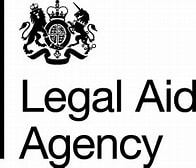Legal Aid

The Legal Aid Agency (LAA) runs the legal aid scheme in England and Wales. The LAA works in partnership with solicitors and not-for-profit organisations to provide information, advice and legal representation to people in need.
They also make sure that people get the information, advice and legal help they need to deal with a wide range of problems.
You might be able to get free and confidential advice from as part of legal aid if you’re in England or Wales.
If you’re eligible, you can get help from CLA (Civil Lega Advice) for problems including:
Debt, if your home is at risk
Housing, if you’re homeless or at risk of being evicted
Domestic abuse
Separating from an abusive partner, when you’re making arrangements for children or sorting out money and property
A child being taken into care
Special education needs
Discrimination
Some child abduction cases
Help is available on 0845 345 4345.
There is information available online HERE
There is information on how to claim HERE which covers civil and criminal legal aid and how to claim for legal aid in an emergency.
Are you still eligible for Legal Aid?
You may believe that legal aid is no longer available and that consequently, you cannot afford a solicitor or a barrister to advise or represent you at court. This may not be the case.
Legal aid is still available for the following areas of family law:
Injunctions against a violent or abusive partner or family member.
The definition of domestic abuse is any incident, or pattern of incidents, of controlling, coercive or threatening behaviour, violence or abuse (whether psychological, physical, sexual, financial or emotional) between individuals who are associated with each other.
Forced marriage protection orders
Social Services involvement with your children.
Where the person needing legal aid is a child under 18 who is a party to family proceedings
International and domestic child abduction To secure an order to prevent the unlawful removal of a child from the UK or securing the return of a child unlawfully removed within the jurisdiction
Aside from the above areas of law, where legal aid remains available, as of 1 April 2013, legal aid for most children, divorce and financial matters in private family law cases was stopped. Funding for these types of matters is however still available where someone has been the victim of domestic abuse or where there are issues of child protection.
In order to qualify for legal aid, however, you must be able to provide supporting evidence.
What counts as evidence?
Because the forms of evidence are prescribed by regulation there is no discretion for the Legal Aid Agency to accept other forms of evidence or for the requirement to be waived in particular cases. You will need to show that you or your children were at risk of harm from an ex-partner or had injuries or a condition caused by domestic abuse or violence.
You can obtain this evidence from:
The Police
Your GP
The courts
a multi-agency risk assessment conference (MARAC)
social services
a health professional, eg a doctor, nurse, midwife, psychologist or health visitor
a refuge manager
a domestic violence support service
How to get evidence?
If you think you may still be eligible for legal aid, you can contact a solicitor for advice.
Alternatively, you can download and print a ‘sample letter’ – see helpful links
This helps you get the proof you need, depending on whether:
- You’ve been a victim of domestic abuse or violence
- Your children have been victims of domestic abuse or violence
You can give the letter to the person you are asking to provide evidence. They should be able to fill in the details for you. You might have to pay a fee for this. You should them take this evidence to a solicitor who may be able to apply for legal aid for you to be advised or represented at court.
In addition to the areas of law where legal aid is still available and those where legal aid is still available if you are eligible and have the correct proof, legal aid is also still available for:
a. Family Mediation
To resolve disputes about children and/or finances on a relationship breakdown
b. Exceptional Funding
You may be able to instruct a solicitor to apply for legal aid for an exceptional case, if you can show that being refused legal aid would infringe:
Your Convention rights (within the meaning of the Human Rights Act 1998)
Any right you may have to the provision of legal services that are enforceable EU rights
If it is appropriate in the particular circumstances of your case
To find a legal advisor or family law mediator who have a Legal Aid Contract in England and Wales click HERE
